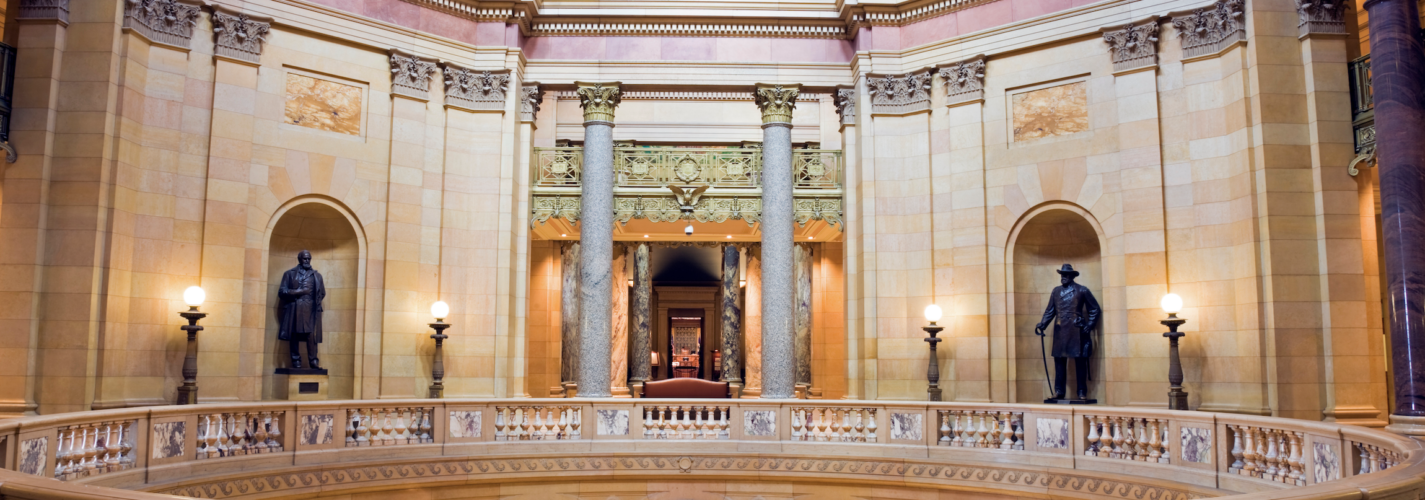More Progression this Session: A Look at EdAllies’ 2024 Policy Priorities
By Matt Shaver
It’s the start of the new year and that means all eyes are on the Capitol for what is sure to be an important, if unique, 2024 legislative session. Despite the plethora of new education policies passed last year, as well as an impending “structural deficit” in the state budget, there is still plenty of room for new & updated legislation to ensure every child in Minnesota has access to a great education. It’s also an election year, with every seat in the Minnesota House up for grabs, so things are bound to get interesting.
What are EdAllies’ top priorities for the 2024 legislative session? There are a few “must-dos” this session that we’ll be weighing in on, like ensuring clear pathways for special education teachers and maintaining clear limits on dangerous holds in schools, as well as some next steps on key areas like literacy and college and career readiness. We’ve bucketed our priorities into three key areas:
Every Student Ready for College and Career
- Make Ongoing Investments in Early Literacy. Last year, Minnesota passed the Read Act—a bill that made sweeping changes to literacy training and instruction to better align with evidence-based practices. As with most major policy reforms, there are a few next steps to advance the work and ensure students master reading in the early grades:
- Increase investments in key areas, such as curriculum and professional development, to ensure state leaders meet ongoing need statewide
- Reshape Literacy Incentive Aid to ensure the funding program supports students who need it most. (Read more in our recent blog about how the current program exacerbates inequities.)
- Expand the scope of the Read Act to support learners from 0-5.
- Establish a Universal FAFSA Policy. Minnesota ranks 40th in the nation for FAFSA completion, and over the past two years we’ve left nearly $100 million on the table in unused Pell grant funds. We should follow the lead of other states and ensure all students complete the FAFSA before they graduate to significantly increase college assistance for low-income families.
- Launch “Automatic Enrollment” Pilot. Across the country, states are seeing success with a course enrollment model that defaults students to the most rigorous option if they’ve demonstrated proficiency in the subject. Evidence shows this reduces disparities in AP, honors, and concurrent enrollment by reducing the subjectively in who gets recommended for or opts into more advanced options. According to a new report from the Department of Education participation in rigorous coursework has declined 41% for students in poverty and 15% for students of color in the last three school years. Minnesota can be a leader in closing gaps by incentivizing districts to pilot automatic enrollment policies.
- Invest in High-Dosage Tutoring: Over the past several years, intensive tutoring has emerged as one of the most effective strategies to address disrupted learning, and a useful supplement to strong core instruction. As federal COVID relief funds sunset, we risk losing effective interventions without ongoing state support.
Welcoming Schools for All
- Uphold Limits on Dangerous Restraints. Last session, legislators passed important and common sense limits on the use of dangerous prone restraints in schools. These holds are not appropriate means of discipline for any child, especially when you consider Minnesota’s stark racial disparities in school discipline practices—yet the new policy became a flash point when School Resource Officers decided to pull their contracts in some districts once they learned of the new law. Leaders should stay the course on offering clarity while maintaining these important limits. Get the in-depth scoop on our recent podcast.
- Take Action on Chronic Absenteeism. The most recent data—and the first released since pre-pandemic—shows 31% of students in Minnesota are chronically absent, meaning they miss more than 10% of the school year. This is a crisis that needs attention now. Policymakers should act to ensure local leaders are tracking and acting on the data, with the supports needed to intervene and get kids back in school.
- Replace Meal Forms with a Better Measure of Poverty. Minnesota now offers universal school meals, which is a huge win for kids. It also creates a window of opportunity to replace the outdated process for how we measure student poverty, looking beyond free and reduced price lunch determinations made when families fill out eligibility forms each year. Policymakers should make it a priority to find a long-term solution using new—and likely more accurate—data sources to prevent distortions in school funding and other metrics.
Diverse & Effective Teacher Workforce
- Ensure Clear Pathways for Tier 1 Special Education Teachers. New federal guidance requires that Tier 1 special education teachers have the training and support to advance to a higher licensure tier within three years. Because special education positions remain persistently hard to fill, it is critical that Minnesota meet this requirement through strategies that effectively support candidates, rather than push them out. We can bring Minnesota into compliance with IDEA without exacerbating existing teacher shortages by creating tailored pathways and effective systems for targeted training and mentorship.
- Remove Barriers for Underrepresented Teachers Through Paid Student Teaching. Most teacher licensure programs require a 12-week, unpaid student teaching experience—a reality that can present a career-ending barrier for candidates who simply cannot afford to work without a wage for 3 months. This barrier is particularly acute for non-traditional students, who may be changing careers, enrolled in school part-time, or supporting a family while completing teacher prep. Minnesota should expand subsidies for student teaching, with a focus on underrepresented teachers of color.
As you can see, despite a blockbuster session in 2023, there is still much work to be done! And this is only a sampling of education issues that will come up this year. If you’d like to learn more, ask questions, or get involved, don’t hesitate to reach out.

